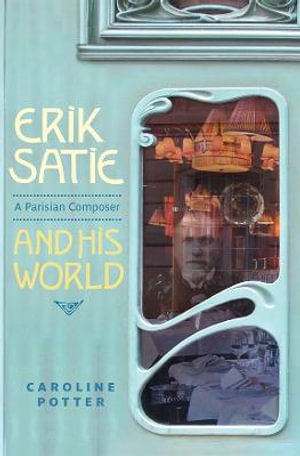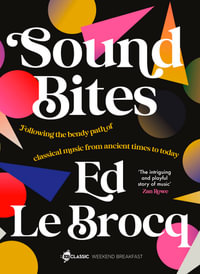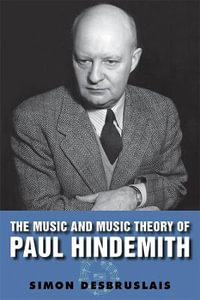
At a Glance
Hardcover
$97.25
Aims to ship in 15 to 25 business days
When will this arrive by?
Enter delivery postcode to estimate
Erik Satie's (1866-1925) music appeals to wide audiences and has influenced both experimental artists and pop musicians. Little about Satie was conventional, and he resists classification under easy headings such as "classical music". Instead of pursuing the path of a professional composer, Satie initially earned a living as a cafe pianist and moved in bohemian circles which prized satire, popular culture and experiment. Small wonder that his music is fundamentally new in conception. It is music which is not always designed to be listened to attentively: music which can be machine-like but is to be played by humans. For Satie, music was part of a wider concept of artistic creation,as evidenced by his collaborations with leading avant-garde artists and in works which cross traditional genre boundaries such as his texted piano pieces. His music was created in some of the most exciting and creatively stimulating environments of the late nineteenth and early twentieth century: Montmartre and Montparnasse. Paris was the artistic centre of Europe, and Satie was a notorious figure whose music and ideas are inextricably linked with the City of Light. This book situates Satie's work within the context and sonic environment of contemporary Paris. It shows that the influence of street music, musicians and poets interested in new technology, contemporary innovations and radical politics are all crucial to an understanding of Satie. Music from the ever-popular Gymnopedies to newly discovered works are discussed, and an online supplement features rare pieces recorded especially for the book.
CAROLINE POTTER is Reader in Music at Kingston University London. A graduate in both French and Music, she has published widely on French music since Debussy and was Series Advisor to the Philharmonia Orchestra's Paris2014-15 season.
Industry Reviews
Potter's book is well written and she supports her knowledge of Satie with her fluency in the French language, as a result of which she is able to discuss the nuances and double entendres of Satie's texted piano works. . . . The primary sources Potter found, and includes in her study, are reason enough to read this book. . . . [A]n important contribution indeed. * ECHO *
Potter's book is especially timely, participating in the recent trend of rethinking early twentieth-century composers . . . within their historical and social contexts. . . . [Her] writing is accessible and engaging. . . . [P]rovides a fresh and nuanced take on a popular but complicated composer. It would be a welcome addition to any library. * NOTES: JOURNAL OF THE MUSIC LIBRARY ASSOCIATION *
Essential reading. * CLASSICAL MUSIC *
No academic library should be without it and both Satie's admirers and detractors will find many thoughtful insights. * FONTES ARTIS MUSICAE *
Potter's scholarly and engaging book brings out the ways in which Satie's music...absorbed the 'sonic environment' of the city. * SUNDAY TIMES *
This is a fascinating tour of Satie's richly bizarre Parisian environment, offering new and valuable insights for both listeners and performers. * [FOUR STARS] BBC MUSIC MAGAZINE *
Anyone seriously interested in Satie needs this well-produced, reasonably priced, lucidly expressed and impressively researched book. * MUSICAL OPINION *
[A] welcome new study. * LITERARY REVIEW *
'This brilliant and accessible new study of Satie gets right inside his contemporary Parisian world, relating its complex and fast-changing artistic climate to scientific and social issues, and most importantly to mechanical and street music. Dr Potter's painstaking and wide research brings many new discoveries too, and leaves us with a clearer vision of what the enigmatic Satie was really about. -- Emeritus Professor Robert Orledge, University of Liverpool
ISBN: 9781783270835
ISBN-10: 1783270837
Published: 18th February 2016
Format: Hardcover
Language: English
Number of Pages: 303
Audience: General Adult
Publisher: Boydell & Brewer Ltd
Country of Publication: GB
Dimensions (cm): 21 x 6.5 x 1.5
Weight (kg): 0.6
Shipping
| Standard Shipping | Express Shipping | |
|---|---|---|
| Metro postcodes: | $9.99 | $14.95 |
| Regional postcodes: | $9.99 | $14.95 |
| Rural postcodes: | $9.99 | $14.95 |
How to return your order
At Booktopia, we offer hassle-free returns in accordance with our returns policy. If you wish to return an item, please get in touch with Booktopia Customer Care.
Additional postage charges may be applicable.
Defective items
If there is a problem with any of the items received for your order then the Booktopia Customer Care team is ready to assist you.
For more info please visit our Help Centre.
You Can Find This Book In
This product is categorised by
- Non-FictionArts & EntertainmentMusicMusic Styles & GenresWestern Classical Music & Opera20th Century & Contemporary Classical Music
- Non-FictionArts & EntertainmentMusicMusical Instruments & Instrumental EnsemblesKeyboard Instruments
- Non-FictionArts & EntertainmentMusicIndividual Composers & Musicians, Specific Bands & Groups
























